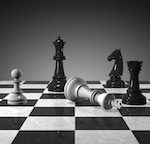I was shocked and saddened, as most were, to read about the shooting death of Michael Brown in Ferguson, Missouri last week. What I was not, unfortunately, was surprised. Stories of police overreaction to the most innocuous of infractions (or none at all) are seemingly no longer the exception in a society where mere behavior, words, or possessions are sufficient evidence of criminality that is too frequently repelled with lethal force. The trivial nature of Brown’s misdeed (walking in the street) coupled with the rapidity and disproportionate response of the officer involved (6 bullets, including 2 to the head!) was illustrative of the small amount of daylight between life inside and outside the prison system.
I (fortunately) lack any direct experience with the prison system; however, what I have read is a realistic portrayal of that system can be found in the television series “Orange is the New Black” (warning: definitely not family friendly). In this series the main character is incarcerated (as are many others) for being involved in one of the many victimless crimes related to the “war on drugs.” The prison depicted is a federal, minimum-security women’s prison. But even under this lightest of all prison environments, life is clearly a stressful and miserable experience, in no small part due to the capricious and vindicate nature of the guards coupled with the lack of autonomy over ones life.
Naturally this is what one would expect; we all know prison is not supposed to be a vacation. It is supposed to be miserable so that it may act as a deterrent. And even when it is not a deterrent then we the public can still rest satisfied in knowing the “bad” people are being appropriately punished. But as it becomes clear that the vast majority of these prisoners are party to “crimes” with no victim, it makes the US prison system less like Dostoyevsky’s Crime and Punishment and more like Stalin’s Gulags. But I digress.
The most frightening aspect of the TV series is not its portrayal of life within prison but rather the realization that we ourselves live in a much larger prison known as the State. This prison has no escape, no furlough and no time off for good behavior. Consider: in prison perceived disrespect toward a guard or failing to immediately and mindlessly follow their directives is met with an immediate and violent response. The same fate is not uncommon for any of us who might fail to immediately comply with the “lawful order of a police officer.” In prison the guards can search the prisoners or their living space at any time for any reason. This is likewise true in many parts of the country under “stop-and-frisk” laws or with the now infamous no-knock-raids. In prison the mail correspondence and voice conversations are closely monitored. Outside prison we have the NSA to take care of that task. In prison the inmates must plead to their intermediaries (the administrative staff) for permission to engage in heretofore-unapproved activities. Outside prison we must plead with our intermediaries (elected officials) for permission (licensing) to engage in an activity so that we can avoid violent reprisals from the state. In prison the belongings of any inmate can be confiscated at any time for any reason. Outside prison our property may be confiscated (civil asset forfeiture) for nothing more than baseless whims of suspicion.The dream of the statist is to push society toward being more, not less, prison like. The statist wants nothing more than to have the power to force all to conform to their vision of the ideal society: behave this way that, not that, eat this, not that, run your business this way, not that, express yourself artistically this way, not that, smoke and drink this, but not that. Where else but in a prison are such visions of the ideal society possible through strict enforcement?
Many might say “hogwash” to all this. They’ll insist they don’t feel like prisoners, they can do whatever they want, whenever they want. That may be true, for some actions, but even prisoners may do things without asking permission or running afoul of a guard; but that does not make them free. They are simply the pinball that has not yet hit the wall. Inside prison the walls are narrow, outside prison the walls are wide – but both have walls. If you remain unconvinced and still need proof that you are but a mere serf living on the master’s (that is, the state’s) land then consider the truth found within an instinctual and visceral emotional response. What do you feel in that moment when you see flashing blue lights in your rearview mirror?








